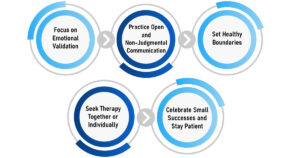The bond between mothers and daughters typically develops into a powerful connection based on trust and comfort. Meanwhile, when the emotional state of a bipolar mother-daughter relationship remains constantly alert, since they cannot predict what mood will appear next. Therefore, the ongoing emotional stress of this situation eventually produces adverse effects on mental health.
Likewise, you must end the bipolar relationship pattern because your mother requires appropriate support to recover from her condition. Getting assistance from professionals stands as the most crucial step toward making progress in the bipolar relationship cycle. The proper treatment combined with appropriate care enables healing to occur. Keep reading to understand the signs of a bipolar mother-daughter relationship and treatment options that can lead to emotional balance and a stronger bond.
What Is a Bipolar Relationship?
A bipolar relationship exists between two partners when one suffers from bipolar disorder, which produces dramatic emotional shifts between manic or hypomanic and depressive states. The shifts in mood produce reactions that modify a person’s thinking and feeling while altering their conduct. Hence, it results in rapid changes throughout the relationship dynamics.
In addition, relationships with bipolar patients tend to be difficult, yet knowing how to support this condition significantly improves the situation. Effective communication between partners who learn about the condition enables them to develop trust, which supports better management of mood swings. Thus, a relationship improves when a person follows their regular treatment plan, which includes both medication and therapy to stabilize their mood.
If you or anyone surrounding you is facing the issue of bipolar disorder, the suitable option for you is to seek some professional help. Therefore, MAVA Behavioral Health is providing mental health services across Texas, Illinois and Florida. You may contact us during working hours as our team is here to assist you all about. So, don’t think anymore, and trust our services once!
Five Signs of a Bipolar Mother
The following five indicators can help identify a bipolar mother who has uncontrolled symptoms of bipolar disorder. The purpose of these signs is to raise awareness and promote support or evaluation if necessary.
- Unpredictable mood swings
- Impulsive or risky behavior
- Periods of extreme energy or fatigue
- Overwhelming guilt or low self-worth
- Difficulty maintaining relationships
The following list includes typical factors that lead to the breakdown of bipolar relationships:
- Lack of communication between partners
- Emotional stress from frequent mood swings
- Loss of trust and emotional connection
- Difficulty maintaining boundaries and personal space
Bipolar Relationship Cycle
A bipolar relationship cycle leads to recurring breakups because of the emotional highs and lows produced by bipolar mood swings. Bipolar disorder patients experience manic phases that lead them to act too confidently and make spontaneous choices. They create relationship distances that they do not fully understand. The person with bipolar disorder experiences deep sadness during depressive episodes, which leads them to attempt reconciliation or relationship repair.
This cycle often includes:
- Mania: Sudden arguments, impulsive breakups, or risky behavior
- Depression: Regret, loneliness, and a desire to get back together
- Reunion: Apologies, promises to change, and a brief period of peace
- Repeat: Another mood shift that starts the cycle again
How to Improve a Bipolar Mother-Daughter Relationship?

Improving a bipolar mother-daughter relationship takes patience, understanding, and consistent effort. Here’s a structured approach with five-line paragraphs under each heading:
1. Focus on Emotional Validation
Exhaust efforts to solve the problem and concentrate on validating emotional experiences with each other. Both of you need to understand the obstacles you encounter while being aware that the disorder creates a significant emotional burden. Therefore, providing support means giving a non-judgmental ear for your mother to express herself. You need to make your mother understand that her emotions are genuine, no matter which direction her moods take. This mutual emotional understanding fosters deeper connection and compassion.
2. Practice Open and Non-Judgmental Communication
Establish a secure conversation environment that protects both parties from criticism. When sharing emotions, choose “I” statements instead of pointing fingers. Accept the feelings of your loved ones even though you maintain different viewpoints. Active listening without interruptions helps people peacefully resolve conflicts. An open dialogue helps to minimize emotional separation between partners.
3. Set Healthy Boundaries
Determine exactly which behaviors are permissible and which ones are prohibited. Feel no shame when you require personal boundaries or when you say no. Urge family members to revisit and change boundaries with the mutual elements of love and understanding.
4. Seek Therapy Together or Individually
Professional treatment provides mental tools that help people control their overwhelming feelings and repetitive problems. Family therapy produces healing results by treating the fundamental causes of problems. Each person uses therapy sessions as an independent space to work through their emotions.
5. Celebrate Small Successes and Stay Patient
The process of recovery, together with rebuilding relationships, needs time. Identify any progress, regardless of size, to maintain your drive. Show appreciation for the hard work and strength shown by each person. The journey matters more than achieving flawless results because progress serves a genuine purpose. Consistency, together with patience, results in long-term positive changes.
How Does Bipolar Affect a Relationship?
Bipolar disorder creates substantial relationship challenges because its patients experience extreme emotional states of mania or hypomania and depression. Individuals during manic phases frequently display impulsive actions, make risky choices, and develop irritability with excessive confidence that generates relationship misunderstandings.
Additionally, when experiencing depression, they tend to pull back emotionally while showing hopelessness and losing interest in their relationship completely. The dramatic shifts in mood generate confusion, frustration, and emotional separation between partners when they lack knowledge about the mental health condition. Hence, having bipolar disorder as a partner presents unique challenges to communication and trust levels, along with emotional stability in a relationship.
Growing up with a Bipolar Mother
Living with a bipolar mother creates an emotionally challenging experience for children. The experience involves managing unpredictable emotional situations, which include both deep bonding with love and detached behavior, and volatile episodes and complete absences.
Furthermore, children in this situation develop early abilities to notice subtle mood changes because they need to predict daily conditions. Monitoring your mother daily becomes mentally draining. Children who had to care for their parents tended to develop relationship and emotional management issues in their adult years. Some common emotional and behavioral patterns experienced by children of bipolar parents include:
- People with this condition must constantly monitor changes in their mood and tone because emotional outbursts might occur at any time.
- Children learn to suppress their emotions to prevent triggering conflicts, which could destabilize their environment.
- Children who prettify themselves assume responsibilities that typically belong to adults, such as becoming caregivers or managing household tasks.
- People with backgrounds of emotional neglect often develop trust issues, which prevent them from creating stable relationships because they fear abandonment and emotional instability.
Impact of Emotional Abuse on Bipolar Relationships on Mental Health
Bipolar relationship patterns that involve emotional abuse create severe detrimental effects on mental health for all partners involved. The condition becomes more difficult to control because emotional abuse causes a decrease in self-esteem.
Similarly, emotional abuse through constant criticism and manipulation, along with gaslighting practices. It will make the victim experience feelings of worthlessness and guilt while questioning their reality and ability to heal. In addition, being in a relationship with someone who has unmanaged bipolar disorder represents a challenging experience for the second partner. It exhibits emotionally abusive behavior that can lead to serious mental health consequences, such as:
- Chronic stress and anxiety
- Depression
- Low self-esteem
- Social isolation
- PTSD symptoms
- Neglect of self-care
Concluding Note
The bipolar mother-daughter relationship cycle creates deep emotional instability, which is together by feelings of guilt and persistent mental health problems. Daughters commonly develop anxiety alongside depression and experience low self-esteem because of their unpredictable emotional interactions with their mothers.
Moreover, the development of healing can be achieved through open communication, therapeutic support, and available support systems. Professional healthcare services at MAVA Behavioral Health consist of comprehensive psychiatric assessments and customized medication treatment plans.
Lastly, our offered services assist persons in confronting the bipolar relationship cycle and emotional challenges while teaching them beneficial coping mechanisms. Contact us at MAVA Behavioral Health for compassionate care that will lead you toward emotional wellness.
FAQs
1. What does a bipolar mother act like?
A bipolar mother demonstrates first an energetic and talkative state, then transitions into a depressive state where she becomes withdrawn. Her mood swings appear abruptly and with great intensity, which makes her behavior difficult to predict. She will display affection during some moments, but she might suddenly transform into someone who becomes irritable or withdraws her affection.
2. How does a bipolar mother affect her children?
The children of mothers with bipolar disorder typically experience anxiety while also dealing with emotional instability and uncertainty about the future. These children commonly experience low self-esteem, together with trust problems, and sometimes develop mental health problems. The extreme emotional ups and downs prove too difficult to handle.
3. What is end-stage bipolar disorder?
A condition becomes an end-stage bipolar disorder when the medical condition advances to a more severe and challenging management state. The condition progresses through multiple mood episodes while causing cognitive impairment and treatment non-responsiveness.
4. Is it hard to live with a bipolar person?
Yes, living with someone who has bipolar disorder can be emotionally challenging. Mood swings, impulsive behavior, or depressive episodes can cause strain in daily life. It may lead to stress, misunderstandings, and emotional fatigue for loved ones. However, with the right treatment and support, the relationship can become more stable.









